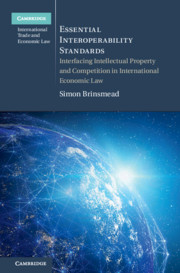 Essential Interoperability Standards
Essential Interoperability Standards from Part I - Foundations and Problems
Published online by Cambridge University Press: 26 October 2021
This chapter examines the relevant international law framework. Particular focus is given to the provisions of international intellectual property law, notably the TRIPS Agreement. The notion of minimum standards embedded in TRIPS is examined, with particular attention given to those aspects of the minimum standards impacting on the interoperability standard-setting landscape. The general lack of corresponding maximum standards is noted. Key flexibilities embedded in TRIPS are then discussed. The chapter then examines other provisions of international economic law with potential to address concerns associated with access to interoperability standards and SEIP: the WTO Agreement on Technical Barriers to Trade (TBT Agreement), the WTO Telecommunications Agreement (notably the GATS Telecommunications Annex and Reference Paper) and the WTO Informational Technology Agreement; international dimensions of competition law are also considered. The chapter concludes that there is no international agreement that is presently well-suited to address concerns associated with access to interoperability standards and SEIP.
To save this book to your Kindle, first ensure [email protected] is added to your Approved Personal Document E-mail List under your Personal Document Settings on the Manage Your Content and Devices page of your Amazon account. Then enter the ‘name’ part of your Kindle email address below. Find out more about saving to your Kindle.
Note you can select to save to either the @free.kindle.com or @kindle.com variations. ‘@free.kindle.com’ emails are free but can only be saved to your device when it is connected to wi-fi. ‘@kindle.com’ emails can be delivered even when you are not connected to wi-fi, but note that service fees apply.
Find out more about the Kindle Personal Document Service.
To save content items to your account, please confirm that you agree to abide by our usage policies. If this is the first time you use this feature, you will be asked to authorise Cambridge Core to connect with your account. Find out more about saving content to Dropbox.
To save content items to your account, please confirm that you agree to abide by our usage policies. If this is the first time you use this feature, you will be asked to authorise Cambridge Core to connect with your account. Find out more about saving content to Google Drive.